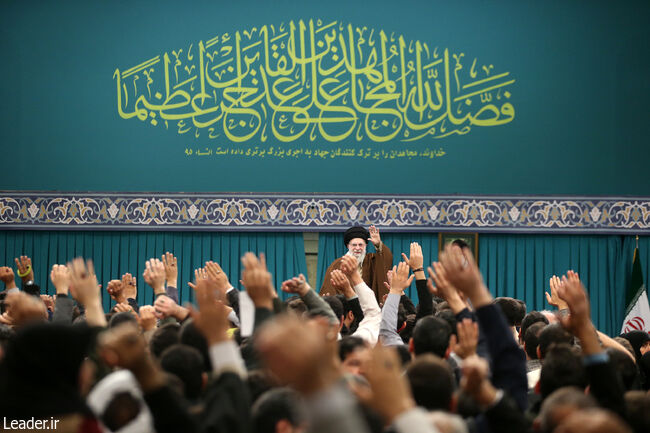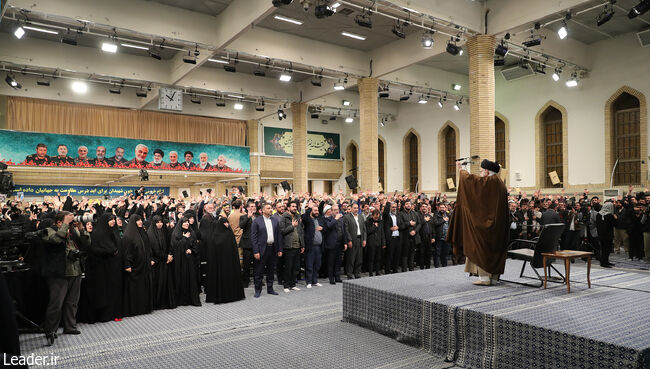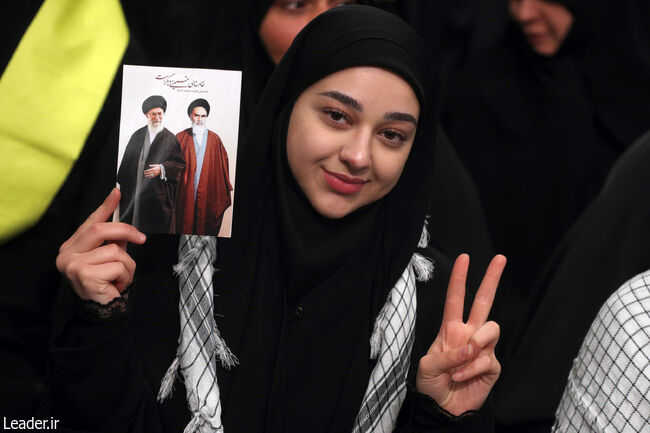This morning, on the eve of the fifth anniversary of General Soleimani's martyrdom, the Supreme Leader of the Islamic Revolution met with the family of General Soleimani and a group of families of the Shrine Defence and Resistance martyrs. During the meeting, he highlighted Haj Qassem Soleimani's particular personality and behavioural traits. He said, "We must learn from these qualities and strive towards the ultimate goal of a Soleimani school of thought: the realisation of Islam and the Quran."
Ayatollah Khamenei also pointed out that, sooner or later, the Syrian people would be victorious over the occupiers, and the resistance in Yemen, Palestine, and Lebanon would continue. Praising the Shrine Defence Martyrs, he remarked, "Soleimani considered Iran itself a sanctuary, and without that pure blood being shed, there would have been no trace of the sanctuaries, shrines, or any of the holy sites today."
The Leader of the Revolution described the presence of thousands of enthusiastic pilgrims from Iran and other countries at the tomb of Martyr Soleimani as an indication of his God-given honour and a result of his sincerity. He said, "As the Quran says, honour belongs solely to God, and this profound truth must be understood and applied in one's life direction and approach."
He described General Soleimani as a great warrior and a dear and close companion, highlighting his bravery, punctuality, and timely presence on the battlefield as some of his outstanding traits. Ayatollah Khamenei talked about Haj Qassem's presence since the early 2000s on the battlefield, fighting against U.S. aggression in Afghanistan and Iraq. He said, "The main goal of the U.S. occupation of these two countries was Iran. However, undeterred by America's superficial might, this noble and sincere man entered the battlefield, ultimately leading to the occupiers' failure and stopping that major conspiracy."
He recalled that General Soleimani avoided discussing or documenting his unique role in those events and said, "However, there is extensive information on this matter that should be preserved as lasting records in the country's political heritage and passed on to future generations."
Ayatollah Khamenei spoke about the defence by a small group of unarmed and defenceless Iraqi youth at the Shrine of Amir al-Mu'minin (AS) during the U.S. invasion. He said, "With a sense of duty, General Soleimani quickly established contact with those youths and saved them. Of course, the religious authority also played an extraordinary and highly effective role in that matter."
He said that the American goal in occupying Iraq was to replace Saddam, adding, "The Americans intended to stay, but General Soleimani and his companions, through a challenging, complex, and prolonged struggle involving a hybrid war, of political, military, propagandistic, and cultural dimensions played a fundamental role in enabling the Iraqi people to take control of their own destiny." The Leader of the Revolution described the defeat of the American-backed ISIS conspiracy as another result of Haj Qassem's swift, timely, and decisive presence on the battlefield. He said, "The Iraqi youth were indeed remarkable In the fight against Takfiri terrorism. However, in neutralising that conspiracy on which the life and future of the region depended, Soleimani played an unparalleled role with his initiative, bravery, self-sacrifice, and strength."
He described General Soleimani's constant strategy in his jihadist efforts as the "revival of the Resistance Front", saying, "A distinctive feature of Soleimani was his exceptional ability to utilise the potential of eager youth, and the patriotic forces of Syria, Lebanon, and Iraq to revive the Resistance in the best possible way."
Referring to the fatwa by the religious authority on the necessity of standing against ISIS, the Leader of the Revolution said, "Thousands of young people heeded that significant fatwa and joined the battlefield, but they lacked organisation and weapons. General Soleimani, with the help of prominent Iraqi fighters, especially the late Martyr Abu Mahdi—an exceptional and invaluable figure—organised, armed, and trained those youths." He said that defending sacred sanctuaries was an enduring principle throughout Haj Qassem's years of jihad and struggle, saying, "General Soleimani also defended Iran as a sanctuary. This logic of defending sacred sanctuaries and shrines is profoundly important and crucial."
Ayatollah Khamenei said, "For General Soleimani, defending the holy sites, including the shrines of the Imams, the Zaynabiyya, the tombs of the companions of Amir al-Mu'minin in Syria and Iraq, and especially Al-Aqsa Mosque, was a key principle. For this reason, Martyr Haniyeh called him the 'Martyr of Al-Quds' during his funeral ceremony."
The Leader of the Revolution pointed out another key trait of Martyr Soleimani: he analysed national issues with a global perspective and avoided a narrow, limited outlook. He said, "He believed that every significant regional and global event also impacts our country. With this vision and calculation, he identified threats beyond our borders and took action to address and prevent them."
He regarded the outstanding traits and characteristics of Martyr Soleimani as worthy of study under the framework of the "Soleimani School of Thought". He elaborated further on the issue; "This school is the same as the school of Islam and the Quran, to which Martyr Soleimani adhered, becoming a benchmark, a centre, and an axis. If we possess the same faith and righteous action, we too can become like Soleimani and be the recipients of divine grace."
In another part of his remarks, Ayatollah Khamenei addressed the significant issue of defending the sanctuaries for which pure blood had been shed. He stated, "Some people, due to a lack of understanding, insight, and proper analysis of events, mistakenly believe and claim that with recent regional developments, the blood shed in defence of the sanctuaries had been wasted. This perception and its expression are grave errors. Without the courageous struggle of Haj Qassem and the Shrine Defenders, today there would be no trace left of the holy shrines, whether the Zaynabiyya or even Karbala and Najaf." He said, "At one point, there was some negligence in Samarra, and the Takfiris, with U.S. support, destroyed the dome and shrine of the Imams al-Askari. If it weren't for the self-sacrifice of faithful young believers, other sacred shrines and Muslim spiritual centres would have faced the same tragic fate. However, the honourable and proud Shrine Defenders stood against the enemy and dealt them a decisive blow."
The Leader of the Revolution described the essence of defending the sanctuaries as not only safeguarding a sacred location but also defending its owner and the school of the great Imams. He stated, "In Quranic culture, any blood that is shed anywhere in the path of truth and for God, even if victory is not achieved, is never wasted and remains valuable before the Lord, just as the blood of Hamza in the Battle of Uhud and, above all, the blood of Imam Husayn (a.s.) in Karbala were not in vain."
Ayatollah Khamenei asserted, "Victory is certain, and the current manoeuvring and agitation of falsehood should not sway us. Those who are dominant today will one day be trampled underfoot by the faithful." He described the events of recent years and the remarkable actions of Martyr Soleimani and his companions, including the defence of the sanctuaries, as signs of the vitality, freshness, and fruitfulness of the Blessed Tree of the Revolution. He said, "Just as in the 1980s, young people would plead with their parents for permission to go to the battlefront, in the 2000s and 2010s, youths like Martyr Hojjaji would kiss their mothers' feet to seek their permission for jihad. These instances demonstrate that, even after 46 years, the Islamic Republic remains alive and vibrant."
He highlighted the readiness of millions of Iranian youth to sacrifice their lives in defence of Islam, saying, "The Shrine Defenders demonstrated that despite the heavy investments and extensive efforts of their adversaries, the flag of resistance continues to fly high. The enemy has not been able, and will not be able, to lower the flag of resistance in Lebanon, Palestine, Syria, Iraq, or Iran."
Ayatollah Khamenei emphasised the necessity of preserving the elements of sovereignty that maintain resilience and national power in any country, saying, "A group of faithful and self-sacrificing youth are the most important pillars of stability and strength for a nation, and such youth should never be sidelined."
The Leader of the Islamic Revolution added, "In our country, this issue is largely taken into account, but other nations should also pay attention to it. The removal of faithful and self-sacrificing youth from the scene can lead to situations similar to Syria's, with chaos and the occupation of their land by foreign aggressors such as the U.S., the Zionist regime, and certain other meddling countries."
He deemed the continued presence of occupying aggressors in Syria as unsustainable. He said, "Syria belongs to the Syrian people, and those encroaching on Syrian soil will undoubtedly be forced to retreat one day when they are confronted by the strength of Syria's brave youth."
Turning to the continuous construction of U.S. bases in Syria, the Leader of the Revolution said, "An aggressor must leave the land that belongs to another nation, or they will be expelled. Accordingly, U.S. bases will inevitably be trampled underfoot by the Syrian youth."
Ayatollah Khamenei emphasised that ultimate victory belongs to the faithful, saying, "Lebanon is a symbol of resistance. Although wounded, it has not bowed and will ultimately prevail. Similarly, Yemen is also a symbol of resistance and will achieve victory. God willing, aggressive enemies, led by the greedy and criminal America, will be forced to leave the people of the region alone and will depart from it in disgrace."
At the beginning of his remarks, the Leader of the Revolution described the month of Rajab as a time for prayer, worship, and seeking closeness to God. Referring to the profound and lofty meanings in the supplications of this month, he added: "The opportunity of Rajab should be utilised to connect hearts, souls, and intentions to the boundless ocean of divine mercy, and to ask God for determination, strength, and success in servitude."
Present at this meeting were the family of General Soleimani, a group of families of the Shrine Defence Martyrs, the families of the martyrs from last year’s terrorist attack at the Golzar Shohada Cemetery in Kerman, the families of the martyrs from the funeral procession of Haj Qassem Soleimani in 2019, and several families of the wounded and martyrs from recent events in Lebanon.



